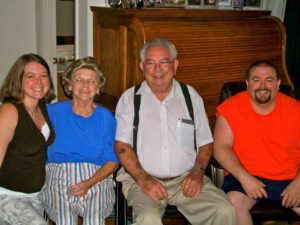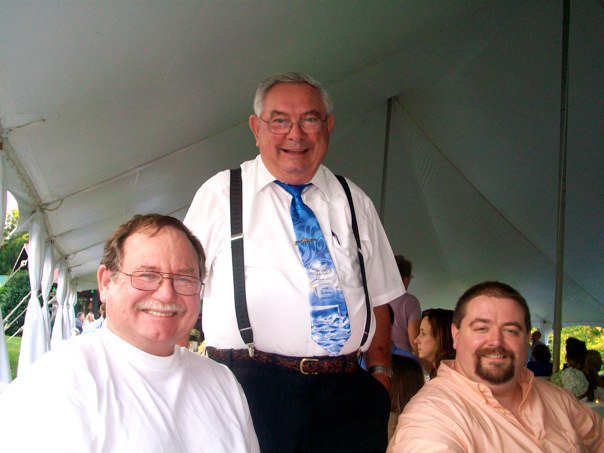By: Brian Chilton | February 7, 2017
On this website, I have posted many articles on the Christian’s need to engage in apologetics. Apologetics being the defense of the Christian faith. I have noted with great frequency the intellectual need to know what one believes and why one believes it. But, I am not only a theologian and an apologist. I am a pastor, too. Being a pastor, I have found that different people handle tragedies differently. No one is prepared for the loss of a family member, especially a close family member.
Being a minister, I have conducted many a funeral. I have held the hands of those who grieve. I have prayed over those who weep. I have spoken condolences to the heart filled with sadness. Yet, nothing could prepare me for the loss of my grandfather–the late Rev. Odell Sisk. It is a different realm when you are the one grieving, the one weeping, and the one whose heart is filled with sadness. Yet through the loss of my grandfather, I found firsthand the amazing benefits of having a robust theology and sturdy apologetic. Four particular benefits stand out.
- Apologetics provides the benefit of theological steadiness amid emotional instability.
There is a danger of becoming excessively emotional and excessively stoic. On the one hand, emotionalism does not lead to rational thought. It is best advised that people do not make major decisions while emotionally distraught. The loss of a loved one will lend toward emotionalism of the kind that does not see the world clearly.
On the other hand, there is also the danger of becoming too stoical, that is, disallowing oneself to experience any emotions whatsoever. Emotions are not bad. We are human beings. We have emotions. We should feel free to express our emotions in healthy manners. Thus, a person should not feel that he or she must suppress their emotions during times of grief. Honestly, I am not an extremely emotional person. I have been told that I have the emotional disposition of that of a rhinoceros’ hide. Perhaps. Of course, you need to have thick skin if you are going to make it in ministry. True, I am more inclined towards the intellectual rather than the emotional side of life. But regardless, I do have emotions and have found that it is important to express them rather than suppress them.
Apologetics amazingly provides theological stability in emotional instability. The apologist will readily have answers to the greater issues that often come by times of loss. Yet, he or she will also be able to express their emotions in a healthy manner. Truth provides stability. Thus, the apologist will find great stability when he or she suffers loss.
- Apologetics provides the benefit of purposeful direction amid temporary chaos.
One question that is often asked when a loved one dies is, “Why did God allow this to happen?” “How could a loving, powerful God allow something like this to happen to my loved one?” These are excellent questions. Quite frankly, I don’t know that we will always have answers to the “why” questions. Some things are known only to God. However, when the world becomes chaotic, a robust theology will help the grieving person know that God has a purpose for allowing things that we do not understand. We understand that God must permit bad before bringing forth the ultimate good. My grandfather’s death did not bother me as much as the suffering he experienced before his passing. Yet, I am reminded that “all things work together for good, for those who are called according to his purpose” (Romans 8:28).[1] Things may seem chaotic during times of distress, but it is great to know that God still works through the bad to bring forth the greatest good.
- Apologetics provides the benefit of eternal hope amid immediate finality.

Death brings great finality. Death reminds us that life is “a mist that appears for a little time and then vanishes” (James 4:14). Those that do not understand the promises of Scripture struggle much more with the finality of death than those who understand the eternal plan of God. I am surprised to find that many do not understand, or flat out deny, the biblical doctrine of the intermediate state.[2] More information on the intermediate state will be posted on Bellator Christi soon. For the believer, death is not final. I realized that my grandfather was in the presence of God. My grandfather was a pastor and a farmer. He was quite physically stout and, like myself, a bit rotund. As I look at my grandfather in the hospital, his once large frame was now frail and thin. I realized that his body would be resurrected to a greater degree than ever before (see 1 Corinthians 15:35ff). This fragile body would one day resurrect to a form of great glory and strength, surpassing the body that he once held. Only a good theology and apologetic would remind me of this truth.
- Apologetics provides the benefit of an outward evangelism amid inward anguish.
My grandfather, being the effervescent, extroverted evangelist that he was, witnessed to his doctors, nurses, and everyone who entered his hospital room while he could. Apologetics and theology helped me understand that despite the anguish of my grandfather’s departure, I had a work to do. I could not stop. In fact, during my grandfather’s funeral, I gave an altar call. Some may shun such an idea. But, if such antagonists realized the great importance Christians have in sharing the gospel, they may rethink such inhibitions. The apologist realizes that the world doesn’t revolve around him or her, but rather in, through, and by the glory of Almighty God.
Conclusion
While I hold to absolute truth, I do not think there is a right and wrong way to grieve. There are healthy and unhealthy ways, undoubtedly. I have found that apologetics is not only beneficial in the intellectual realm, it is also beneficial in the emotional side, too. I am reminded of a conversation that Greg Koukl had with a caller on his show Stand to Reason. The caller had recently experienced loss and wanted to know how to remain focused on God during this time. Koukl wisely told him something that he had learned. He said, “Focus on the things you know.” I think there is great wisdom in that statement. There are many things we do not and will not understand about God. No one should expect to know everything about God because if they could they would be God. But, God has revealed many things about himself and the world to us. Theology and apologetics help us to focus on the things we know and trust God for the things we don’t. Apologetics had an added benefit that I had never expected. Apologetics helped me to grieve in a healthy manner and to remain focused on the God who gave us life.
 Brian Chilton is the founder of BellatorChristi.com and is the host of The Bellator Christi Podcast. He received his Master of Divinity in Theology from Liberty University, his Bachelor of Science in Religious Studies and Philosophy from Gardner-Webb University, received certification in Christian Apologetics from Biola University, and hopes to work on doctorate studies soon. Brian is the pastor of Huntsville Baptist Church in Yadkinville, North Carolina.
Brian Chilton is the founder of BellatorChristi.com and is the host of The Bellator Christi Podcast. He received his Master of Divinity in Theology from Liberty University, his Bachelor of Science in Religious Studies and Philosophy from Gardner-Webb University, received certification in Christian Apologetics from Biola University, and hopes to work on doctorate studies soon. Brian is the pastor of Huntsville Baptist Church in Yadkinville, North Carolina.
Notes
[1] Unless otherwise noted, all Scripture comes from the English Standard Version (Wheaton: Crossway, 2007).
[2] An article on the intermediate state is coming soon. The intermediate state is the state of existence between death and the final resurrection.
© 2017. Bellator Christi.






[…] Read the rest at: https://bellatorchristi.com/2017/02/07/an-unexpected-benefit-of-apologetics/ […]
Thanks for sharing!